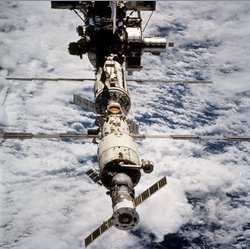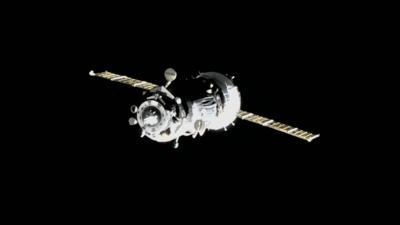Na Zdorovye, Tovarisch!
Soviet-era cosmonaut Valery Polyakov, who logged the single longest stay in space, has died at the age of 80.

In a social media post, officials of Roscosmos, the state entity responsible for the entirety of the Russian Federation’s space undertakings, wrote: “The Roscosmos State Corporation regrets to announce the death of the Hero of the Soviet Union, Hero of Russia, USSR pilot-cosmonaut, holder of the world record for the longest flight into space (437 days) Valery Polyakov. We express our deep condolences to the relatives and friends of Valery Vladimirovich."
Selected for the distinction in 1972, Polyakov was among the third group of Russian medical doctors to undergo cosmonaut training. His first orbital venture was aboard Soyuz TM-6, which launched on 29 August 1988 and paired Polyakov with commander Vladimir Lyakhov and Intercosmos cosmonaut Abdul Ahad Momand, the first Afghani to fly into space. After a three-day journey, the Soyuz TM-6 capsule delivered the three cosmonauts safely to the Soviet Union’s storied Mir space station. After nine days, Lyakhov and Momand returned to Earth. Polyakov, however, remained aboard Mir, becoming part of the third crew to live aboard the space station. In all, Polyakov's first trip to Mir saw him pass 241-days on the space station before the intrepid cosmonaut returned to Earth on 27 April 1989.
Polyakov’s second and final trip to space would test the human body’s ability to sustain long-duration spaceflights—such as those NASA hopes will one day carry spacefarers to Mars and beyond. Launching aboard Soyuz TM-18 on 8 January 1994 with fellow cosmonauts Viktor Afanasyev and Yuri Usachov, Polyakov began an unprecedented 437-day stay aboard Mir as part of the station’s 15th expeditionary crew.
After 179 days, Afanasyev and Usachov returned to Earth. The pair was relieved by Yuri Malenchenko and Talgat Musabayev, who joined Polyakov for 123 days of his odyssey. In time, Malenchenko and Musabayev, too, returned to Earth, relieved in turn by cosmonaut Yelena Kondakova and German cosmonaut Ulf Merbold.
On 22 March 1995, after more than 14-months in space, Polyakov—accompanied by Kondakova and Merbold—returned to Earth aboard Soyuz TM-20. Upon landing, Polyakov declared to his crewmates: “We can fly to Mars.”
Valery Vladimirovich Polyakov was born on 27 April 1942, in the Russian city of Tula. He attended I.M. Sechenov First Moscow State Medical University where he earned a doctorate in medicine. Polyakov later specialized in astronautics medicine at the Institute of Medical and Biological Problems (IMBP).

In 1964, after watching the first physician fly into space (cosmonaut Boris Yegorov on Voskhod 1), Polyakov decided to specialize in space medicine.
Throughout his record-setting spaceflight, Polyakov's medical and psychological states were closely monitored. Upon returning to Earth, he underwent two follow-up exams by which researchers determined Polyakov’s 437 days, 17 hours and 58 minutes in space had resulted in no lasting adverse somatic or psychological effects. Polyakov did experience brief declines in mood during his first and last months aboard Mir, but neither long-term cognitive nor emotional disturbances were observed throughout the duration of his life.
Retiring from the cosmonaut corps in 1995, Polyakov became deputy director of Moscow’s Ministry of Public Health. The position granted him medical oversight of long-duration Russia space missions. As a member of the Russian Chief Medical Commission, Polyakov also contributed to the recruitment and selection of cosmonaut candidates.
For his service to the Soviet and Russian space programs, Polyakov was named a Hero of the Soviet Union, a Hero of the Russian Federation, and awarded the Order of Lenin.
Polyakov was married to Nelli Mastakova, with whom he had one child, Yelena.
 ANN's Daily Aero-Linx (05.06.25)
ANN's Daily Aero-Linx (05.06.25) ANN's Daily Aero-Term (05.06.25): Ultrahigh Frequency (UHF)
ANN's Daily Aero-Term (05.06.25): Ultrahigh Frequency (UHF) ANN FAQ: Q&A 101
ANN FAQ: Q&A 101 Classic Aero-TV: Virtual Reality Painting--PPG Leverages Technology for Training
Classic Aero-TV: Virtual Reality Painting--PPG Leverages Technology for Training Airborne 05.02.25: Joby Crewed Milestone, Diamond Club, Canadian Pilot Insurance
Airborne 05.02.25: Joby Crewed Milestone, Diamond Club, Canadian Pilot Insurance




